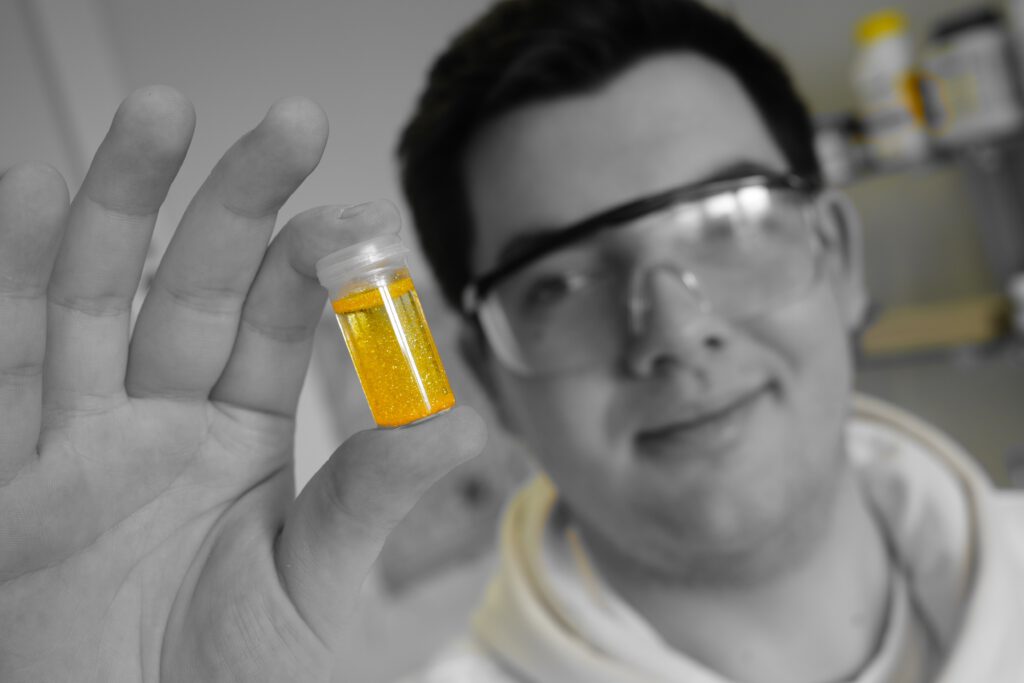
Bachelor
chemistry
Short info about the course of study
| Restricted admission | Standard period of study | Start of studies |
| no | 6 semesters | Winter semester |
Authorisation procedure
The degree program is admission-free, you can enroll directly without an application.
Enrolment deadline
16 July – 29 August 2025
completion
Bachelor of Science
Language of instruction
German
The course of study
In the Bachelor's programme in Chemistry, you will first receive basic training in the chemical subjects and neighbouring natural sciences. The study is characterized by a high proportion of experimental work in the laboratory, which is very good. In addition, there are training courses in career-relevant key qualifications such as scientific writing and presentation. With a bachelor's degree in chemistry, you have the best foundation for the master's program in chemistry or related programs. As a rule, our students also aim for a doctorate (Dr. rer. nat.) after the master's program.

5 reasons to study chemistry in Siegen
✓ You study in small groups
✓ You get a very good care
✓ You have very good job prospects
✓ You will receive a solid basic training in the chemical subjects
✓ You can get a taste of neighbouring natural sciences
Career prospects
A variety of professional opportunities await you: Industry, research institutes, universities, schools and the public sector offer interesting and financially attractive prospects. You can use your chemical expertise later in various fields of activity. These include research and development, laboratory management, production and environmental protection, but also sales, marketing or management consulting.

This is what Moritz Dango says about his course of study:
‘The Bachelor’s programme in Chemistry lays the optimal foundations for further studies in this field.’
Read more
Already during my school days I was interested in the natural sciences and especially in chemistry and therefore decided to study chemistry in Siegen.
The Bachelor's programme in Chemistry lays the optimal foundations for further studies in this field. The field of chemistry convinces with a good supervision rate in relation to other universities. Direct contact with professors is usually very easy. Through the university's internal laboratory internships, you can quickly and easily get to know the doctoral students in the working groups as well as students of higher semesters as important contact persons. All in all, it is a very family environment where you always have someone to answer and support you. I particularly like the tradition of many working groups to have lunch together in the canteen.
Despite this manageable environment, there are many options when it comes to later specialization. A number of compulsory elective lectures are offered, in which there is something thematically for everyone. The various working groups are also broad in content, from theoretical calculations and modelling to basic research and research with a direct application reference, everything is represented.
I myself have deepened in the field of inorganic chemistry and am currently writing my master's thesis there. I am involved in the production of novel phosphors. These are important for many applications, such as optimizing technology (mobile phones, screens) or for medical applications as cancer cell markings or as counterfeit protection on banknotes.
For anyone who likes to stand in the laboratory, experiment and want to try something new and is interested in the basics of chemistry, I can highly recommend a bachelor's degree in chemistry at the University of Siegen.
Admission requirements
The B.Sc. Chemistry always begins in the winter semester. Requirements for access are the general university entrance qualification, the subject-specific university entrance qualification or the technical college entrance qualification. Applicants with a subject-specific university entrance qualification or a technical college entrance qualification must meet certain entry requirements: Information on application and enrolment
Study structure
| Section I – Basic studies | |
| 1. semesters General chemistry, Inorganic chemistry 1, Mathematics, Physics | 2. semesters Analytical Chemistry, Inorganic Chemistry 2, Mathematics (continued), Organic Chemistry 1, Physics (continued) |
| Section II - Basic Studies | |
| 3. semesters Inorganic chemistry 3, Organic chemistry 2, Organic chemistry 3, Physical chemistry 1 | 4. semesters Construction and Materials Chemistry, Macromolecular Chemistry, Physical Chemistry 2, Internship Physical Chemistry, Physical Chemistry 3 |
| Section III – Compulsory electives | |
| 5. semesters Communication techniques, in-depth internship 1, in-depth internship 2, elective subject 1 | 6. semesters Legal-Security-Toxicology, Elective 2, Elective 3 Bachelor thesis |
Compulsory elective 1: All chemical compartments
Compulsory elective 2: Inorganic chemistry, Organic chemistry, Physical chemistry
Compulsory elective 3: All chemical subjects and didactics of chemistry
In the subject examination regulations you will find further information about your course of study such as the course plan and detailed module descriptions:
Subject Examination Regulations (FPO-B) for Chemistry (CHEM) in the Bachelor's programme at the University of Siegen from 9 April 2024
You can reach your future fellow students via the student council:
Student council chemistry-biology

Advice and contact
Make an appointment now at:
info.studienberatung@zsb.uni-siegen.de
or by phone at: 0271 740-2712
(Mon – Thu: 9 a.m. - 4 p.m. / Fri: 9 a.m. – 12 noon)